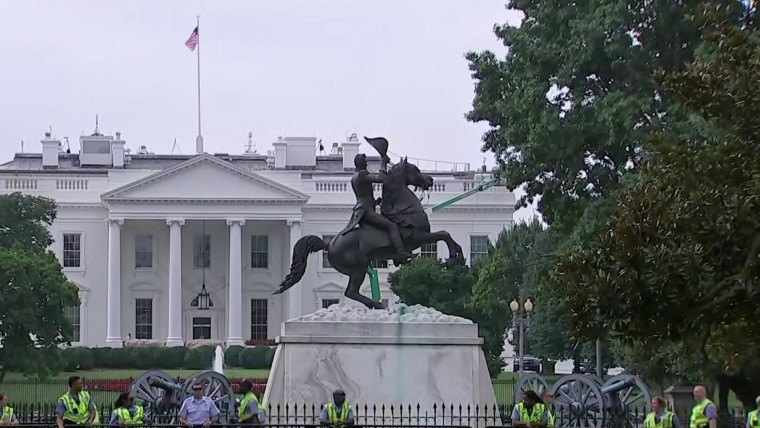WASHINGTON — President Donald Trump gave the Republicans in Congress a tough choice Tuesday night: vote to honor leaders of the Confederacy, or vote against him.
“I will Veto the Defense Authorization Bill if the Elizabeth…Warren (of all people!) Amendment, which will lead to the renaming (plus other bad things!) of Fort Bragg, Fort Robert E. Lee, and many other Military Bases from which we won Two World Wars, is in the Bill!” Trump wrote on Twitter late Tuesday night, referring to the Democratic senator from Massachusetts.
It was at least the second time Trump has addressed the idea of renaming Army bases named in honor of Confederate officers. In early June, amid widespread protests against police brutality and racial discrimination, the president said he would “not even consider” it. But it is the first time he has said specifically that he would veto the defense bill over the matter.
Recent polls show that many more Americans want to keep the names than scrap them — the vast majority of Republicans don’t want a change — and Trump has been running his re-election campaign almost exclusively as an exercise in firing up his political base.
The threat is implicit: Republicans in Congress who buck him risk his wrath.
But there’s a complicated political calculus for GOP lawmakers, some of whom are in tough re-election contests in states and districts where a vote for Confederate generals could be toxic among swing voters and others who may worry about how the issue will be viewed in the future. Younger Americans are much more likely to approve of the removal of Confederate statues from public places.
Trump, who has shown little interest in broadening his coalition, is operating on a different timeline. He only has to worry about the political horizon of the four months before November’s election. What he sees as good for him right now doesn’t necessarily match the best interests of his Republican colleagues in Congress.
By threatening a veto, Trump is forcing them to choose, particularly Senate Majority Leader Mitch McConnell, R-Ky. It’s McConnell who will have to decide whether to allow an amendment to strip out or alter Warren’s provision creating a commission to rename the bases.
McConnell has kept his cards close to his vest but indicated he could accept a change in nomenclature.
“If it’s appropriate to take another look at these names, I’m OK with that,” McConnell said, according to The Associated Press. “Whatever is ultimately decided, I don’t have a problem with.”
The Senate Armed Services Committee avoided a roll call vote when it adopted Warren’s provision by voice vote last month. In the House, Reps. Anthony Brown, D-Md., and Don Bacon, R-Neb., introduced a similar bill that is likely to be incorporated into their chamber’s version of the legislation.
“As the most diverse and integrated part of American society, it is only right that our installations bear the names of military heroes who represent the best ideals of our Republic,” Bacon, a retired Air Force brigadier general who represents a swing district, said in a statement. “We owe this to ourselves, to our military, our veterans, and to every American who will answer the call.”
With Mississippi deciding in the past few days to remove the Confederate emblem from its state flag, it seems unlikely that Congress will side with Trump on voting affirmatively to preserve the names of military bases that commemorate turncoats who fought to maintain the enslavement of Black people.
There may be a third option for lawmakers.
Sen. Josh Hawley, R-Mo., who opposes Warren’s effort, had drafted language that would weaken her mandate for the Department of Defense to change the names of certain military bases. His version would similarly establish a commission to review the names, but it would only be required to report to Congress on its findings, including both the costs of changes and input from the communities surrounding the bases.
“The reality though is that this was never about the Confederacy,” Hawley said in a statement when he released his proposal. “That’s what left-wing activists want us to believe. The events of the last few weeks where rioters have attacked American and religious landmarks tell us otherwise.”
The issue is so charged that any amendment designed to frustrate Warren’s purpose could create discomfort for some GOP lawmakers and their party leaders.
Senate Minority Leader Chuck Schumer, D-N.Y., said Wednesday he believes Warren’s provision will become law.
“This is nothing but the typical bluster from President Trump,” he said. “The [defense bill] will pass and we will scrub from our military bases the names of men who fought for the Confederacy, who took up arms against our country.”
But if Trump gets his way, that won’t happen without a high-profile and politically fraught fight for GOP lawmakers.













